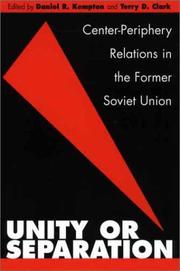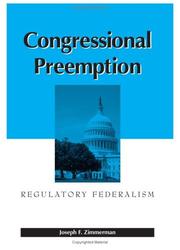| Listing 1 - 10 of 156 | << page >> |
Sort by
|

ISBN: 0275973069 9780313074820 0313074828 9780275970116 0275970116 9780275973063 0275970116 Year: 2002 Publisher: Westport, Conn. : Praeger,
Abstract | Keywords | Export | Availability | Bookmark
 Loading...
Loading...Choose an application
- Reference Manager
- EndNote
- RefWorks (Direct export to RefWorks)
Central-local government relations --- Federal government --- Center-periphery government relations --- Local-central government relations --- Local government-central government relations --- Political science --- Decentralization in government --- Russia (Federation) --- Ethnic relations.
Book
ISBN: 2371540161 Year: 1989 Publisher: Éditions de l’IHEAL
Abstract | Keywords | Export | Availability | Bookmark
 Loading...
Loading...Choose an application
- Reference Manager
- EndNote
- RefWorks (Direct export to RefWorks)
En Amérique latine, depuis le début des années quatre-vingt, deux phénomènes majeurs, l'approfondissement de la crise financière-économique et l'évolution démocratique, ont renouvelé les termes et les enjeux d'un débat désormais généralisé sur les rapports entre pouvoirs centraux, pouvoirs régionaux et pouvoirs locaux. En France, dans la même période, mais dans un contexte politique différent, la discussion puis l'application des lois de décentralisation ont répondu à la volonté des sociétés locales de prendre une plus grande part dans la détermination de leur destin et de celui de leur territoire. Démocratisation et modernisation, modernisation et démocratisation sont ainsi devenues, tant en France (en Europe devrait-on dire) qu'en Amérique latine les mots-clés, les références incontournables pour toute réflexion sur les voies et moyens permettant d'affronter les mutations imposées par la compétition internationale.
Local government --- Regionalism --- Central-local government relations --- Center-periphery government relations --- Local-central government relations --- Local government-central government relations --- Political science --- Decentralization in government --- Federal government --- gouvernement central --- régionalisation économique --- décentralisation administrative --- administration locale --- collectivités locales
Book
ISBN: 0191682047 9780191682049 Year: 1996 Publisher: Oxford : Clarendon,
Abstract | Keywords | Export | Availability | Bookmark
 Loading...
Loading...Choose an application
- Reference Manager
- EndNote
- RefWorks (Direct export to RefWorks)
This work traces the main dimensions of the relationship between central and local government, concentrating upon the role played by law in shaping that relationship. It demonstrates how the issues raised are linked to the system of parliamentary democracy, and to the tradition of public law.
Central-local government relations --- Local government --- Law - Non-U.S. --- Law, Politics & Government --- Law - Great Britain --- Law and legislation --- Center-periphery government relations --- Local-central government relations --- Local government-central government relations --- Political science --- Decentralization in government --- Federal government

ISBN: 0791482731 1423747852 9781423747857 0791465632 9780791465639 9780791482735 0791465640 9780791465646 Year: 2005 Publisher: Albany : State University of New York Press,
Abstract | Keywords | Export | Availability | Bookmark
 Loading...
Loading...Choose an application
- Reference Manager
- EndNote
- RefWorks (Direct export to RefWorks)
Congressional Preemption provides an in-depth account of the use of preemption powers by Congress to either partially or completely remove regulatory authority from state and local governments in a wide variety of fields. Author Joseph F. Zimmerman exposes the inadequacies of the two current theories of United States federalism—dual and cooperative—by exploring the impact of Congress' frequent use of its preemption powers since 1965. While the dual and cooperative federalism theories retain a degree of explanatory power, Zimmerman considers why they do not explain the profound systemic changes produced by congressional preemption. Other topics covered include congressional use of conditional grants-in-aid, crossover sanctions, tax credits, tax sanctions, and partial and complete redemption; the theory of political safeguards of federalism; and the Blackmun Thesis, which encourages states to seek relief from preemption statutes in Congress and not the courts. The book concludes with postulates of a broader theory of federalism and recommendations addressed to Congress to reinvigorate the federal system.
Central-local government relations --- Federal government --- Center-periphery government relations --- Local-central government relations --- Local government-central government relations --- Political science --- Decentralization in government --- States' rights (American politics) --- Federaal bestuur: USA.
Book
ISBN: 1483349470 1483301346 9781483301341 9781483349473 1306640202 9781306640206 9781452203256 1452203253 1544303610 9781544303611 Year: 2012 Publisher: Washington, D.C. : CQ Press,
Abstract | Keywords | Export | Availability | Bookmark
 Loading...
Loading...Choose an application
- Reference Manager
- EndNote
- RefWorks (Direct export to RefWorks)
In this volume students can see just how much the landscape of intergovernmental relations has evolved in recent years, with diminishing vertical flows of resources, and increased horizontal flows in the form of cross-jurisdictional and interlocal collaboration.
Federal government --- Central-local government relations --- Intergovernmental fiscal relations --- Intergovernmental cooperation --- Center-periphery government relations --- Local-central government relations --- Local government-central government relations --- Political science --- Decentralization in government --- States' rights (American politics)
Book
ISBN: 1421424649 9781421424644 9781421424637 1421424630 Year: 2018 Publisher: Baltimore : Baltimore, Md. : Johns Hopkins University Press, Project MUSE,
Abstract | Keywords | Export | Availability | Bookmark
 Loading...
Loading...Choose an application
- Reference Manager
- EndNote
- RefWorks (Direct export to RefWorks)
Democracy --- Central-local government relations --- Decentralization in government --- Educational accountability --- Education and state --- Education --- Center-periphery government relations --- Local-central government relations --- Local government-central government relations --- Political science --- Federal government --- Standards
Book
ISBN: 9353280737 9352806727 9352806735 9789352806720 9789352806737 9789352806713 9352806719 9789353280734 Year: 2018 Publisher: Los Angeles, CA : SAGE Publications, Inc.,
Abstract | Keywords | Export | Availability | Bookmark
 Loading...
Loading...Choose an application
- Reference Manager
- EndNote
- RefWorks (Direct export to RefWorks)
Higher Education in Federal Countries: A Comparative Study is a unique study of higher education in nine federal countries--the United States, Canada, Australia, Germany, Mexico, Brazil, Russia, China and India. In this book, leading international scholars discuss the role of federalism and how it shapes higher education in major nation-state actors on the world stage. The editors develop an overarching comparative analysis of the dynamics of central and regional power in higher education, and the national case studies explain how each federal and federal-like higher education system has evolved and how it functions in what are highly varied contexts.
Higher education and state --- Federal government --- Central-local government relations --- Center-periphery government relations --- Local-central government relations --- Local government-central government relations --- Political science --- Decentralization in government --- Education, Higher --- State and higher education --- Education and state --- Government policy
Book
ISBN: 0639995632 9780639995632 0639923836 9780639923833 Year: 2019 Publisher: Baltimore, Maryland : Baltimore, Md. : Project Muse, Project MUSE,
Abstract | Keywords | Export | Availability | Bookmark
 Loading...
Loading...Choose an application
- Reference Manager
- EndNote
- RefWorks (Direct export to RefWorks)
Post-1994, South Africa's traditional leaders have fought for recognition, and positioned themselves as major players in the South African political landscape. Yet their role in a democracy is contested, with leaders often accused of abusing power, disregarding human rights, expropriating resources and promoting tribalism. Some argue that democracy and traditional leadership are irredeemably opposed and cannot co-exist. Meanwhile, shifts in the political economy of the former bantustans -- the introduction of platinum mining in particular -- have attracted new interests and conflicts to these areas, with chiefs often designated as custodians of community interests. This edited volume explores how chieftancy is practised, experienced and contested in contemporary South Africa. It includes case studies of how those living under the authority of chiefs, in a modern democracy, negotiate or resist this authority in their respective areas. Chapters in this book are organised around three major sites of contest: leadership, land and law.
Democratization --- Local government --- Chiefdoms --- Central-local government relations --- Center-periphery government relations --- Local-central government relations --- Local government-central government relations --- Political science --- Decentralization in government --- Federal government --- Chieftaincies --- Chieftainships --- Political anthropology --- South Africa --- Politics and government
Book
ISBN: 9780511642319 9780521764933 9780511641770 051164177X 0521764939 1107208629 9781107208629 0511700253 9780511700255 1282386638 9781282386631 0511641095 9780511641091 9786612386633 6612386630 0511639333 9780511639333 0511638264 9780511638268 0511640412 9780511640414 0511642318 Year: 2010 Publisher: Cambridge, UK ; New York : Cambridge University Press,
Abstract | Keywords | Export | Availability | Bookmark
 Loading...
Loading...Choose an application
- Reference Manager
- EndNote
- RefWorks (Direct export to RefWorks)
This book investigates the self-organizing responses of governments and interests to the institutional collective action (ICA) dilemmas of particular concern to students of federalism, urban governance, and regional management of natural resources. ICA dilemmas arise in fragmented systems whenever decisions by one independent formal authority do not consider costs or benefits imposed on others. The ICA framework analyzes networks, joint projects, partnerships, and other mechanisms developed by affected parties to mitigate ICA decision externalities. These mechanisms play a widespread role in federalist systems by reshaping incentives to encourage coordination/cooperation. The empirical studies of urban service delivery and regional integration of regional resource management address three questions: How does a given mechanism mitigate costs of uncoordinated decisions? What incentives do potential members have to create the mechanism? How do incentives induced by the mitigating mechanism affect its sustainability in a changing environment and its adaptability to other ICA dilemmas?
Public administration --- Intergovernmental cooperation --- Public-private sector cooperation --- Central-local government relations --- Federal government --- States' rights (American politics) --- Center-periphery government relations --- Local-central government relations --- Local government-central government relations --- Political science --- Decentralization in government --- Social Sciences --- Political Science

ISBN: 0203009258 9780203009253 9780714653877 071465387X 9780714683232 071468323X 071468323X 071465387X 9781135761691 1135761698 9781135761646 1135761647 9781135761684 113576168X 1280055960 Year: 2003 Publisher: London ; Portland, Or. : Frank Cass,
Abstract | Keywords | Export | Availability | Bookmark
 Loading...
Loading...Choose an application
- Reference Manager
- EndNote
- RefWorks (Direct export to RefWorks)
Annotation
Decentralization in government --- Regionalism --- Nationalism --- Central-local government relations --- Center-periphery government relations --- Local-central government relations --- Local government-central government relations --- Political science --- Federal government --- Human geography --- Interregionalism --- Political aspects
| Listing 1 - 10 of 156 | << page >> |
Sort by
|

 Search
Search Feedback
Feedback About UniCat
About UniCat  Help
Help News
News